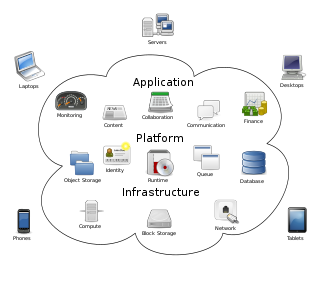Bigtable is a fully managed wide-column and key-value NoSQL database service for large analytical and operational workloads as part of the Google Cloud portfolio.
Google Workspace is a collection of cloud computing, productivity and collaboration tools, software and products developed and marketed by Google. It consists of Gmail, Contacts, Calendar, Meet and Chat for communication; Drive for storage; and the Google Docs Editors suite for content creation. An Admin Panel is provided for managing users and services. Depending on edition Google Workspace may also include the digital interactive whiteboard Jamboard and an option to purchase add-ons such as the telephony service Voice.
Cloud storage is a model of computer data storage in which data, said to be on "the cloud", is stored remotely in logical pools and is accessible to users over a network, typically the Internet. The physical storage spans multiple servers, and the physical environment is typically owned and managed by a cloud computing provider. These cloud storage providers are responsible for keeping the data available and accessible, and the physical environment secured, protected, and running. People and organizations buy or lease storage capacity from the providers to store user, organization, or application data.

Amazon Elastic Compute Cloud (EC2) is a part of Amazon's cloud-computing platform, Amazon Web Services (AWS), that allows users to rent virtual computers on which to run their own computer applications. EC2 encourages scalable deployment of applications by providing a web service through which a user can boot an Amazon Machine Image (AMI) to configure a virtual machine, which Amazon calls an "instance", containing any software desired. A user can create, launch, and terminate server-instances as needed, paying by the second for active servers – hence the term "elastic". EC2 provides users with control over the geographical location of instances that allows for latency optimization and high levels of redundancy. In November 2010, Amazon switched its own retail website platform to EC2 and AWS.

G.ho.st was the trading name of Ghost Inc. and the service name and URL of the company's hosted computer operating system or web desktop service. Its name is an acronym of Global Hosted Operating SysTem. The old URL G.ho.st was a domain hack. In April 2010 Ghost closed its service due to competition and lack of funding.

Cloud computing is the on-demand availability of computer system resources, especially data storage and computing power, without direct active management by the user. Large clouds often have functions distributed over multiple locations, each of which is a data center. Cloud computing relies on sharing of resources to achieve coherence and typically uses a pay-as-you-go model, which can help in reducing capital expenses but may also lead to unexpected operating expenses for users.
This is a comparison of notable file hosting services that are currently active. File hosting services are a particular kind of online file storage; however, various products that are designed for online file storage may not have features or characteristics that others designed for sharing files have.

Gladinet, Inc. is an American corporation co-founded by Jerry Huang and Franklyn Peart in 2008 in Lake Worth, Florida. The company provides cloud computing software, including an on-premises, enterprise file synchronization and sharing (EFSS) platform. The on-premises version of the platform is available for service providers and enterprises. There is also a team edition.

A virtual private cloud (VPC) is an on-demand configurable pool of shared resources allocated within a public cloud environment, providing a certain level of isolation between the different organizations using the resources. The isolation between one VPC user and all other users of the same cloud is achieved normally through allocation of a private IP subnet and a virtual communication construct per user. In a VPC, the previously described mechanism, providing isolation within the cloud, is accompanied with a virtual private network (VPN) function that secures, by means of authentication and encryption, the remote access of the organization to its VPC resources. With the introduction of the described isolation levels, an organization using this service is in effect working on a 'virtually private' cloud, and hence the name VPC.

Google Cloud Storage is a RESTful online file storage web service for storing and accessing data on Google Cloud Platform infrastructure. The service combines the performance and scalability of Google's cloud with advanced security and sharing capabilities. It is an Infrastructure as a Service (IaaS), comparable to Amazon S3. Contrary to Google Drive and according to different service specifications, Google Cloud Storage appears to be more suitable for enterprises.

OpenStack is a free, open standard cloud computing platform. It is mostly deployed as infrastructure-as-a-service (IaaS) in both public and private clouds where virtual servers and other resources are made available to users. The software platform consists of interrelated components that control diverse, multi-vendor hardware pools of processing, storage, and networking resources throughout a data center. Users manage it either through a web-based dashboard, through command-line tools, or through RESTful web services.

Google Cloud Print was a Google service that allowed users to print from any Cloud Print-aware application on any device in the network cloud to any printer with native support for connecting to cloud print services – without Google having to create and maintain printing subsystems for all the hardware combinations of client devices and printers, and without the users having to install device drivers to the client, but with documents being fully transmitted to Google. Starting on July 23, 2013 it allowed printing from any Windows application, if Google Cloud Printer was installed on the machine.

Google Cloud Connect was a free cloud computing plug-in for Windows Microsoft Office 2003, 2007 and 2010 that can automatically store and synchronize any Microsoft Word document, PowerPoint presentation, or Excel spreadsheet to Google Docs in Google Docs or Microsoft Office formats. The Google Doc copy is automatically updated each time the Microsoft Office document is saved. Microsoft Office documents can be edited offline and synchronized later when online. Google Cloud Sync maintains previous Microsoft Office document versions and allows multiple users to collaborate, working on the same document at the same time. Google Cloud Connect was discontinued on April 30, 2013, as according to Google, all of Cloud Connect's features are available through Google Drive.
Greenqloud is a cloud computing software company with headquarters in Reykjavik, Iceland, and office in Seattle, Washington, offering cloud computing software and services. Greenqloud develops and sells the cloud and infrastructure management software Qstack for the global market.
A cloud database is a database that typically runs on a cloud computing platform and access to the database is provided as-a-service. There are two common deployment models: users can run databases on the cloud independently, using a virtual machine image, or they can purchase access to a database service, maintained by a cloud database provider. Of the databases available on the cloud, some are SQL-based and some use a NoSQL data model.
Google Drive is a file-hosting service and synchronization service developed by Google. Launched on April 24, 2012, Google Drive allows users to store files in the cloud, synchronize files across devices, and share files. In addition to a web interface, Google Drive offers apps with offline capabilities for Windows and macOS computers, and Android and iOS smartphones and tablets. Google Drive encompasses Google Docs, Google Sheets, and Google Slides, which are a part of the Google Docs Editors office suite that allows collaborative editing of documents, spreadsheets, presentations, drawings, forms, and more. Files created and edited through the Google Docs suite are saved in Google Drive.
Backend as a service (BaaS), sometimes also referred to as mobile backend as a service (MBaaS), is a service for providing web app and mobile app developers with a way to easily build a backend to their frontend applications. Features available include user management, push notifications, and integration with social networking services. These services are provided via the use of custom software development kits (SDKs) and application programming interfaces (APIs). BaaS is a relatively recent development in cloud computing, with most BaaS startups dating from 2011 or later. Some of the most popular service providers are AWS Amplify and Firebase.
Google Cloud Platform (GCP) is a suite of cloud computing services offered by Google that provides a series of modular cloud services including computing, data storage, data analytics, and machine learning, alongside a set of management tools. It runs on the same infrastructure that Google uses internally for its end-user products, such as Google Search, Gmail, and Google Docs, according to Verma et al. Registration requires a credit card or bank account details.
Client-side encryption is the cryptographic technique of encrypting data on the sender's side, before it is transmitted to a server such as a cloud storage service. Client-side encryption features an encryption key that is not available to the service provider, making it difficult or impossible for service providers to decrypt hosted data. Client-side encryption allows for the creation of applications whose providers cannot access the data its users have stored, thus offering a high level of privacy.
An elastic cloud is a cloud computing offering that provides variable service levels based on changing needs.







